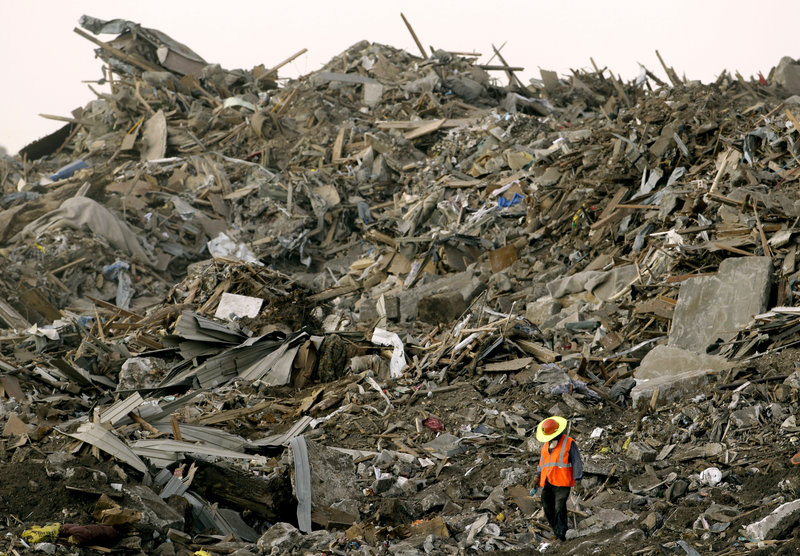– The Associated Press
JEFFERSON CITY, Mo. – The tornado that tore through Joplin a year ago already ranks as the deadliest twister in six decades. Now it carries another distinction — the costliest since at least 1950.
Insurance policies are expected to cover most of the $2.8 billion in damage. But taxpayers could supply about $500 million in the form of federal and state disaster aid, low-interest loans and local bonds backed by higher taxes, according to records obtained by The Associated Press and interviews with federal, state and local officials.
Almost one-fifth of that money was paid to contractors who hauled off debris. Tens of millions more dollars went to individuals for temporary housing and other living expenses in the immediate aftermath of the storm. Additional money could help subsidize construction of a new hospital to replace one that was irreparably damaged.
All told, about two dozen school districts, emergency agencies, public housing authorities, religious groups and other nonprofits could receive taxpayer money through a program run by the Federal Emergency Management Agency.
The outpouring of assistance is nowhere near the scale of Hurricane Katrina, which swamped New Orleans and damaged property along a wide swath of the Gulf Coast in 2005. Yet the Joplin tornado raises questions anew about the government’s role in disasters.
The Joplin tornado, which killed 161 people, was one of 99 major disasters declared by President Obama in 2011. Congress responded in December by authorizing an extra $8.6 billion in disaster aid.
Missouri has a rainy-day fund with about $500 million that was created for costly emergencies. But the fund hasn’t been tapped for Joplin because Gov. Jay Nixon and some lawmakers are reluctant to trigger a constitutional mandate that the borrowed money be replenished within three years.
Some critics of federal disaster aid point to Missouri’s rainy-day fund as a prime example of how states pass the buck to the federal government for local tragedies.
“It seems to me this indicates the bad incentive problem that comes with federal involvement — that states would rather tap federal taxpayers before they have to tap their own taxpayers,” said Chris Edwards, an economist and editor of downsizinggovernment.org, a website run by the Washington-based Cato Institute, a group that promotes free markets.
FEMA Director Craig Fugate said it takes an especially destructive tornado to trigger federal aid. What made the Joplin tornado so unusual was the intensity of the devastation in such a concentrated area, he said.
“We’re talking thousands of families impacted, hundreds of deaths, the trauma to the community alone was overwhelming,” Fugate said. “The likelihood of Joplin being able to recover successfully without federal assistance … warranted the president declaring it” a disaster zone.
Some of the taxpayer-subsidized projects, such as rebuilding St. John’s Regional Medical Center, will benefit people well beyond Joplin. The hospital expects to get more than $345 million from insurance. It’s submitted more than $88 million of expenses to FEMA, of which the federal government could pay for 75 percent. The rest will be covered by private donations and the resources of the Sisters of Mercy Health System, which runs the hospital.
The cost of replacing damaged school buildings will be covered largely by insurance, too. But voters recently approved the largest bond issue in Joplin history — $62 million — to help rebuild or repair 10 school buildings. The resulting property tax increase is about 10 percent.
Federal disaster aid rules also reward local entities for the charitable work and donations of others. Joplin expects to receive $1 million through FEMA as a partial credit for an estimated $17.7 million worth of volunteer labor and donated supplies and services. That money can be used to offset the city’s own expenses for debris cleanup and emergency response.
“The fact that we can basically break even from a tornado of this magnitude is astonishing, and it’s in large part due to the donated resources,” city Finance Director Leslie Jones said.
Send questions/comments to the editors.



Success. Please wait for the page to reload. If the page does not reload within 5 seconds, please refresh the page.
Enter your email and password to access comments.
Hi, to comment on stories you must . This profile is in addition to your subscription and website login.
Already have a commenting profile? .
Invalid username/password.
Please check your email to confirm and complete your registration.
Only subscribers are eligible to post comments. Please subscribe or login first for digital access. Here’s why.
Use the form below to reset your password. When you've submitted your account email, we will send an email with a reset code.